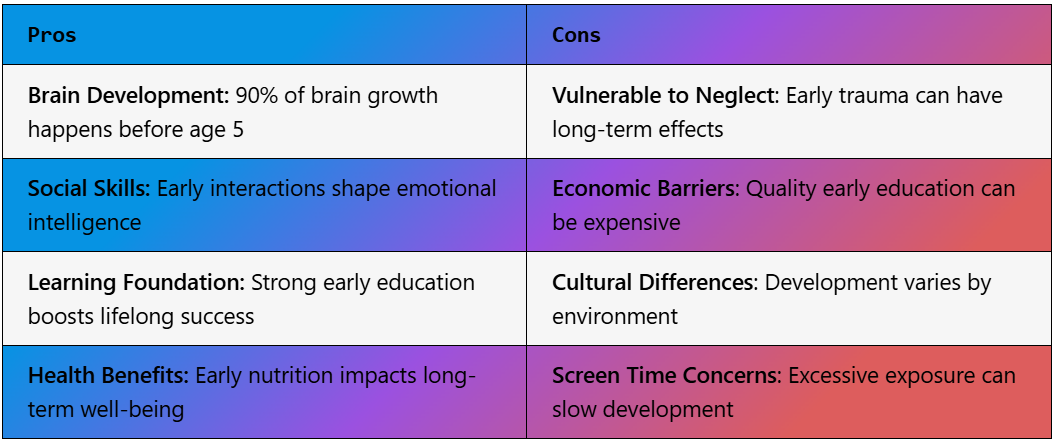Understanding Facts About Early Childhood is essential as it establishes the groundwork for a child’s future learning and overall well-being. Remarkably, a child’s brain develops more rapidly in the first five years than at any other stage. This time is crucial not only for physical growth but also for the development of cognitive, emotional, and social skills.
For example, children enrolled in early childhood education programs, such as those provided by Head Start, often demonstrate enhanced academic performance and social abilities later in life. Here are some key facts that underscore the significance of early childhood development:
- Brain Development: By age three, a child’s brain reaches about 80 percent of an adult’s size, making early experiences critical for cognitive advancement.
- Language Skills: Children who are exposed to rich language environments during their early years tend to have larger vocabularies, which contributes to better communication skills.
- Social Skills: Early childhood education promotes social interactions, teaching children how to cooperate, share, and resolve conflicts—skills vital for building lifelong relationships.
Investing in early childhood education benefits not just individual children but society as a whole. Programs like Head Start ensure that low-income families have access to quality education, giving every child the chance to thrive. Understanding these facts helps us recognize the vital role early childhood development plays in creating a brighter future for our children.
Contact Now to Pursue Your Dream Degree From Your Nearest College
Key Milestones in Early Childhood Growth
Early childhood development is a remarkable journey marked by milestones that significantly influence a child’s future. From birth, a baby’s brain develops rapidly, reaching about 80 percent of an adult’s size by age three. This emphasizes the critical role of early childhood education, particularly programs like Head Start, which provide essential foundational skills.
These early years are crucial not only for physical skills like walking and talking but also for emotional and social growth. Key milestones in early childhood can be grouped into cognitive, physical, social, and emotional categories. For example, children recognize familiar faces by six months and can form simple sentences by age two. Here are some insights into these milestones:
- Cognitive Development: Exploration leads to problem-solving skills.
- Physical Development: Fine motor skills improve through grasping and manipulation.
- Social Development: Peer interactions encourage sharing and cooperation.
- Emotional Development: Children express emotions, vital for relationship building.
Recognizing these milestones enables parents and educators to foster supportive environments. Engaging children through play, reading, and structured activities enhances their development. Programs like Head Start focus on both academic and social-emotional learning, equipping children for future success. By celebrating these milestones, we can better support our children on their lifelong learning journey.
The Role of Play in Early Childhood Learning
One of the most surprising facts about early childhood development is the crucial role of play in shaping a child’s learning journey. Play is not just a fun activity; it is essential for cognitive, social, and emotional growth. Through play, children explore their environment, develop problem-solving skills, and learn to interact with others.
Programs like Head Start emphasize the importance of play-based learning in their curriculum. When children engage in imaginative play, they are honing creativity and critical thinking. For example, pretending to be a doctor teaches empathy and responsibility. Here are some key benefits of play in early childhood learning:
- Enhances social skills through teamwork and communication.
- Boosts cognitive development via problem-solving and exploration.
- Supports emotional growth by allowing expression of feelings and coping with challenges.
- Fosters physical development through active play, improving coordination and motor skills.
Play is a natural way for children to learn about the world, allowing them to experiment, take risks, and learn from mistakes in a safe environment. This hands-on approach is vital for developing resilience and adaptability. Incorporating play into early childhood education not only makes learning enjoyable but also aids in information retention, making education both fun and effective.

How Nutrition Influences Early Childhood Development
Early childhood development often emphasizes education and social skills, but nutrition plays a surprisingly critical role in a child’s growth. The food consumed during these formative years is foundational for physical health, cognitive abilities, and emotional well-being.
Research indicates that children who receive balanced meals tend to excel in early childhood education programs, such as Head Start, which highlights the importance of nutrition alongside learning. Key insights into how nutrition impacts early childhood development include:
- Brain Development: Proper nutrition is essential for brain growth, with nutrients like omega-3 fatty acids linked to improved cognitive function and memory.
- Physical Growth: A balanced diet supports healthy physical development, ensuring children grow at a normal rate and have the energy needed for play and learning.
- Emotional Health: Foods rich in vitamins and minerals can positively influence mood and behavior, with diets high in fruits and vegetables promoting better emotional regulation.
- Long-term Benefits: Adequate early nutrition is associated with greater academic and social success later in life, making it a vital aspect of early childhood education.
Incorporating healthy eating habits into early childhood education can foster a nurturing environment that enhances overall development. By prioritizing nutrition, we not only improve children’s learning experiences but also equip them for a successful future.
The Impact of Early Relationships on Child Development
The early years of a child’s life are vital for their overall development, with early relationships playing a surprisingly significant role. Children flourish in environments filled with security and love, which helps establish their emotional and social skills. For example, children who receive consistent affection from caregivers tend to develop strong self-esteem and healthier relationships as they grow.
Research indicates that children enrolled in quality early childhood education programs, such as Head Start, greatly benefit from nurturing relationships. These programs focus not only on academic skills but also on social-emotional learning. Key benefits of fostering strong early relationships include:
- Enhanced emotional regulation
- Improved social skills
- Better academic performance
- Increased resilience in facing challenges
The Head Start curriculum actively involves families in the learning process, further supporting these early relationships. When parents and caregivers engage, children feel more understood and supported. This holistic approach ensures that children are learning within a network of love and support, which is crucial for their growth. Ultimately, the impact of these early relationships is profound, as they are foundational to a child’s future success.
Surprising Facts About Brain Development in Young Children
Early childhood development often emphasizes physical growth and social skills, but one of the most surprising aspects is the rapid brain development during these years. Remarkably, a child’s brain reaches about 90 percent of its adult size by age five. This growth is significantly influenced by early childhood education programs like Head Start, which offer enriching experiences that stimulate cognitive development. Here are some key facts about brain development in young children:
- Neuroplasticity: Young children’s brains are highly adaptable, allowing them to form new connections and pathways more easily than adults. This adaptability makes early experiences crucial for effective learning.
- Critical Periods: There are specific windows for learning skills, such as language acquisition. Engaging children in conversations and reading to them can greatly enhance their language abilities during these times.
- Emotional Development: Emotional experiences play a vital role in shaping brain architecture. Positive interactions with caregivers foster healthier emotional regulation and resilience later in life.
- Play is Learning: Play is essential for brain development. Through play, children explore their environment, develop problem-solving skills, and learn social interactions.
By understanding these facts, parents and educators can create supportive environments that promote optimal brain development, setting the stage for lifelong learning and success.
Contact Now to Pursue Your Dream Degree From Your Nearest College
The Significance of Early Childhood Education Programs
Early childhood education programs play a crucial role in shaping a child’s future learning and development. Research indicates that children who engage in high-quality early education are more likely to excel academically and socially. For example, studies show that those enrolled in programs like Head Start exhibit better literacy and numeracy skills than their peers who do not participate in such programs.
A surprising fact about early childhood development is the rapid growth of a child’s brain during the first five years. By age three, a child’s brain reaches about 80 percent of an adult’s size, making this period vital for cognitive, emotional, and social growth. Early childhood education programs leverage this potential by creating structured environments for exploration and learning. Here are some key benefits of these programs:
- Enhanced social skills: Children learn to interact with peers and adults, fostering teamwork and communication.
- Improved academic readiness: Early exposure to literacy and numeracy prepares children for future learning.
- Emotional development: Programs assist children in managing emotions and building resilience.
- Lifelong benefits: Quality early education reduces dropout rates and increases the likelihood of pursuing higher education.
By incorporating comprehensive curricula like Head Start, we ensure that children receive a well-rounded education that meets their diverse needs. Investing in early childhood education nurtures young minds and shapes the future of our society.
Read Also: Where Can You Find a Free AI Language Tutor?
Cultural Influences on Early Childhood Development
Cultural influences significantly shape early childhood development, often in surprising ways. For example, children from collectivist cultures, such as many Asian and African communities, tend to develop strong social skills and a sense of community early on. In contrast, individualistic cultures like the United States emphasize independence and self-expression.
These cultural differences not only affect parenting styles but also the educational approaches in early childhood education. A notable aspect of early childhood development is the impact of programs like Head Start, which aim to provide low-income children with a solid foundation for future learning. Research indicates that participants in Head Start often show improved cognitive skills, better social-emotional development, and higher graduation rates. Key benefits of such programs include:
- Enhanced language and literacy skills
- Improved social skills and behavior
- Increased likelihood of academic success
- Greater access to health and nutrition resources
Additionally, early childhood education curricula are often tailored to reflect the cultural backgrounds of the children. Incorporating diverse stories, songs, and activities enriches the learning experience and fosters a sense of belonging. This cultural responsiveness helps children appreciate diversity and prepares them for a globalized world. Understanding these cultural influences is essential for parents and educators navigating the complexities of early childhood development.
Long-Term Effects of Early Childhood Experiences
Early childhood development is a crucial phase that significantly influences a child’s immediate behavior and long-term emotional and cognitive health. Research indicates that children who engage in quality early childhood education programs, such as those provided by the Head Start curriculum, tend to exhibit enhanced academic performance and social skills as they grow. This highlights the importance of nurturing environments for young minds. Here are some key facts illustrating the long-term effects of early childhood experiences:
- Brain Development: By age five, a child’s brain reaches about 90 percent of its adult size, marking a vital period for learning.
- Social Skills: Early interactions with caregivers and peers are essential for developing social skills necessary for future relationships.
- Emotional Resilience: Supportive environments help children build emotional regulation, equipping them to handle stress and challenges effectively.
- Economic Impact: Investing in early childhood education can lead to substantial economic benefits, with studies indicating that every dollar spent can yield up to seven dollars in returns for society.
These insights emphasize the need to cultivate positive experiences during early childhood. By focusing on quality education and supportive environments, we can pave the way for a brighter future for our children.
Contact Now to Pursue Your Dream Degree From Your Nearest College
FAQs
-
What age range is considered early childhood?
Early childhood typically refers to the period from birth to around 8 years old. -
Why are the early years important for a child’s development?
The brain develops rapidly during early childhood, laying the foundation for cognitive, social, emotional, and physical growth. -
How much of the brain develops by age 5?
Around 90% of a child’s brain development occurs by the age of 5. -
What is the most important thing parents can do for their child in early childhood?
Providing a loving, stimulating, and supportive environment with rich learning opportunities helps children thrive.


